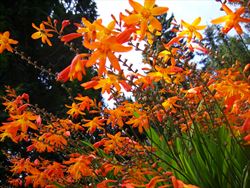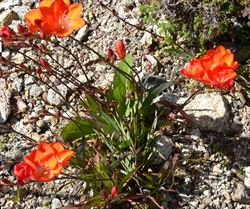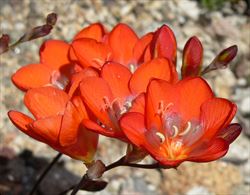Click on images to enlarge

By Dellex (Own work) [GFDL (http://www.gnu.org/copyleft/fdl.html) or CC BY-SA 3.0 (http://creativecommons.org/licenses/by-sa/3.0)], via Wikimedia Commons

Stan Shebs [GFDL (http://www.gnu.org/copyleft/fdl.html), CC BY-SA 3.0 (http://creativecommons.org/licenses/by-sa/3.0) or CC BY-SA 2.5 (http://creativecommons.org/licenses/by-sa/2.5)], via Wikimedia Commons

Stan Shebs [GFDL (http://www.gnu.org/copyleft/fdl.html), CC BY-SA 3.0 (http://creativecommons.org/licenses/by-sa/3.0) or CC BY-SA 2.5 (http://creativecommons.org/licenses/by-sa/2.5)], via Wikimedia Commons
Scientific Name
Tritonia crocata (L.) Ker Gawl.
Synonyms
Ixia crocata L.
Family
Iridaceae
Common Names
blazing star, blazing stars, orange tritonia
Origin
Native to south-western Africa (i.e. Cape Province in South Africa).
Naturalised Distribution
Widely naturalised in southern Australia (i.e. in the coastal districts of south-western Western Australia, in south-eastern South Australia and in southern Victoria). Also naturalised on Norfolk Island.
Notes
Orange tritonia (Tritonia crocata) is regarded as an environmental weed in Victoria. This species has escaped cultivation as a garden ornamental and also grows along roadsides, in shrublands and grasslands, and in disturbed natural vegetation around old settlements between Perth and Albany in south-western Western Australia.
This is also one of the tritonias (Tritonia spp.) that are listed as common environmental weeds of the Adelaide region. These species are particularly invasive in bushland in the Adelaide Hills Council District.

